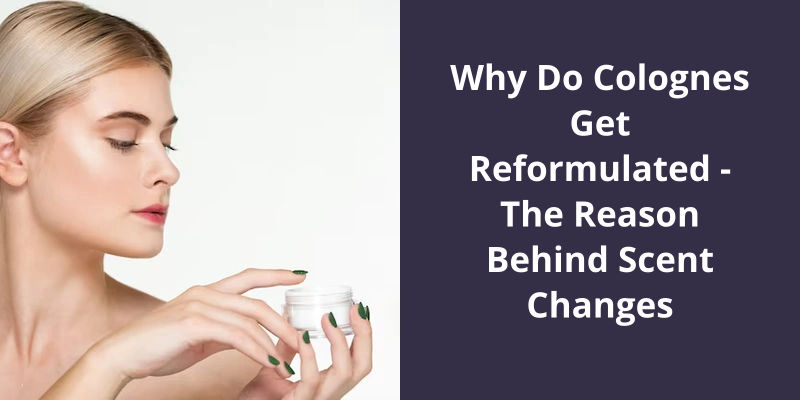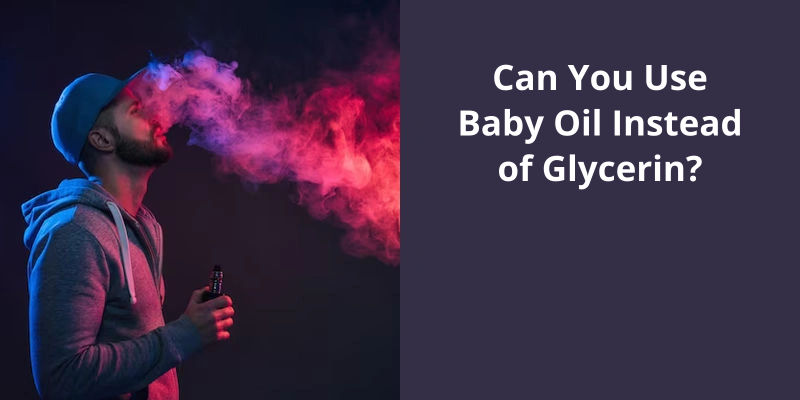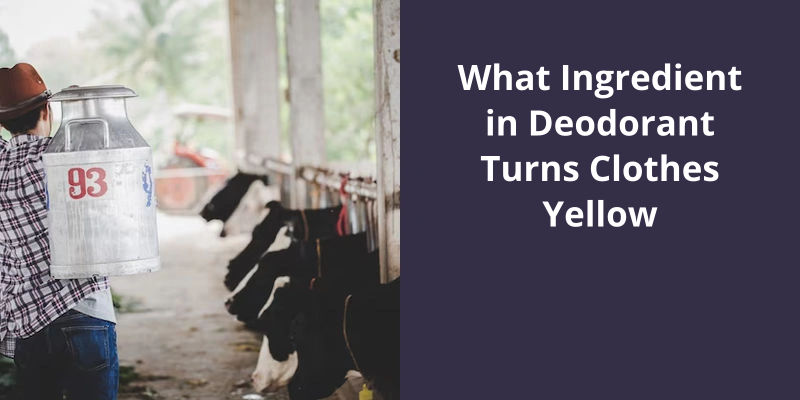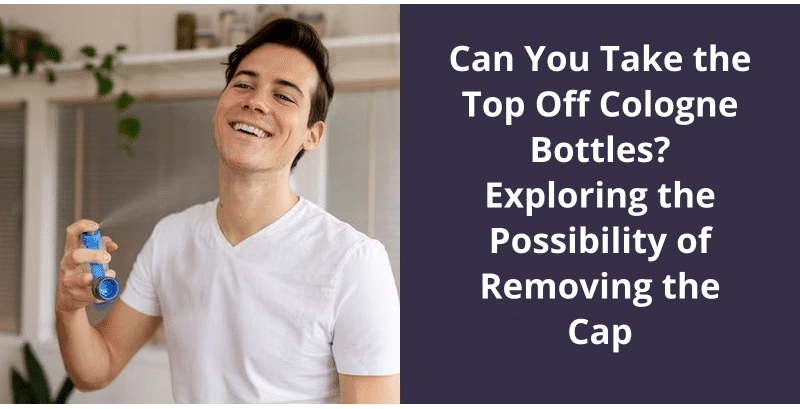Colognes get reformulated primarily due to regulatory restrictions and cost considerations. Sometimes, the ingredients used in the original formula can be restricted or banned by regulatory bodies due to potential health risks, causing companies to alter the formulation to comply with the guidelines. Cost cutting could be another reason. If an ingredient becomes too expensive, a cheaper substitute might be used instead. Additionally, companies may also reformulate their products in an effort to update the fragrance in response to changing consumer preferences or to innovate and improve the product.

Why Doesn’t My Cologne Smell Good Anymore?
Cologne is an essential part of a mans wardrobe. It helps in exuding confidence, sophistication and leaves a lasting impression on people around. However, over time, one might notice that their cologne doesn’t smell as great as it used to. This is primarily due to heat, humidity, and bright light damaging the composition of the fragrance. These factors can cause the scent to become mustier, making it less appealing when applied.
When stored in a bathroom medicine cabinet or a sunny windowsill, cologne is exposed to direct sunlight, heat, and moisture, leading to it’s quicker breakdown. As heat causes the scent molecules to evaporate faster from the surface of the skin, it weakens the scents longevity. Humidity can cause unwanted reactions between the fragrances ingredients, leading to off-smelling and oxidation of the top notes.
To preserve the fragrance, it’s crucial to keep it in it’s original packaging. The box protects the cologne from dust, light, and moisture, which slows down the oxidation process and extends the fragrances lifespan. If the fragrance doesn’t come in it’s own box, opt for a cool, dry place, like a nightstand drawer or wardrobe. This keeps the fragrance away from light and heat, helping to prolong it’s lifespan.
Additionally, avoid shaking your cologne bottle. Doing this can cause air to transfer into the bottle, reacting with the fragrances ingredients and altering it’s natural composition. Instead, use the bottles atomizer or apply the fragrance straight onto the skin. Once applied to the skin, itll start to react with the natural oils, becoming much more pronounced and taking on a unique scent.
Moreover, it’s important to keep in mind that cologne formulas can be affected by the quality of their ingredients. Natural ingredients tend to be more delicate and can spoil faster than their synthetic counterparts. Therefore, it’s important to choose quality fragrance oils that hold their scent for longer periods.
If your cologne is starting to smell off, heat, humidity, and bright light are likely to be the culprits. To prevent this, store it in it’s original box, keep it away from direct sunlight and heat, and avoid shaking the bottle. By following these steps, you won’t only preserve the fragrances longevity but also enjoy it’s full-bodied scent for years to come.
How to Properly Apply Cologne for Maximum Effectiveness
- Apply cologne after showering when your skin is clean and moist.
- Hold the bottle 3-6 inches away from your skin and spray it on your neck, chest, and wrists.
- Don’t rub the cologne into your skin, let it dry naturally.
- Apply cologne sparingly, you don’t want to overdo it.
- Consider the time of day and occasion before choosing a cologne.
- Reapply cologne after a few hours if needed.
- Store cologne in a cool, dry place away from direct sunlight to preserve it’s scent.
- Experiment with different types of cologne to find the ones that work best for you.
Now that we know the basics of what cologne is, let’s dive deeper into it’s purpose and what scents it should ideally have. After all, with so many cologne options out there, it can be tough to know what type of fragrance is best for you.
What Is Cologne Supposed to Smell Like?
Cologne has been a go-to fragrance for generations of men, and it’s popularity shows no signs of waning. While the term cologne is often used to describe any perfume for men, the original eau de cologne was a specific type of fragrance developed in Cologne, Germany in the early 18th century. It was typically made with extracts of citrus fruits, herbs, and spices, and was designed to be a refreshing and invigorating scent that could be worn on a daily basis.
Today, cologne is still known for it’s light, fresh, and fruity qualities, although the ingredients and scents used in modern colognes have evolved over time. Most colognes today are composed of 2-4% perfume oils in alcohol and water, which makes them lighter and less intense than other types of fragrances. Because of this, they tend to be used in fragrances marketed towards younger people, who prefer lighter, more subtle scents.
Despite it’s long history and enduring popularity, cologne remains a subject of debate among fragrance enthusiasts. Some argue that it’s best worn sparingly, as a subtle undertone to ones natural scent, while others advocate for a more bold and assertive approach to cologne application.
As with all things that have a scent, perfume and cologne can eventually go bad. However, the longevity of each fragrance varies widely depending upon it’s unique chemical composition. While some high-end perfumes from famous brands may remain usable for years, others may degrade and change in scent much more quickly. So, does Cologne change scent over time? Let’s delve deeper into this topic and explore what factors can lead to changes in fragrance quality.
Does Cologne Change Smell Over Time?
However, it’s important to note that perfumes and colognes are sensitive to heat, light, and air exposure. Exposure to these conditions can cause a fragrance to deteriorate and lose it’s original scent. For example, if you leave your perfume bottle in a hot car or near a window where it’s constantly exposed to sunlight, it’s chemical composition can change, causing the fragrance to degrade faster than normal.
Perfumes and colognes also have different lifespans based on their concentration of fragrance oils. Eau de parfums (EDP) and parfums (Perfume) generally last longer than eau de toilettes (EDT) or colognes because they’ve a higher concentration of fragrance oils. However, this doesn’t necessarily mean theyre immune to expiration. Even high-end perfumes and colognes can go bad if stored improperly or exposed to harsh conditions for an extended period of time.
It’s also important to note that a fragrances shelf life can be affected by how it’s stored. To keep your cologne smelling fresh for as long as possible, store it in a cool, dark place away from direct sunlight. You can also keep your perfume in it’s original box to help protect it from air and light exposure.
So, you may have noticed that your beloved cologne smells different all of a sudden. There are several factors that may contribute to this, including changes in weather, lifestyle habits, and even mood. But before you go tossing out your pricey fragrance, let’s take a closer look at what could be causing this pesky little problem.
Why Does My Cologne Smell Different All of a Sudden?
When you first start using a cologne, you may notice that it’s a unique smell that youve never experienced before. As you use it more, the smell may start to feel more familiar to you, and you might even start to associate it with certain memories or emotions.
If you travel to a location that’s at a higher or lower altitude than you’re used to, the change in pressure can affect the way your sense of smell works.
Temperature and humidity can also play a role in how your cologne smells to you. In general, perfumes tend to work best in moderate temperatures and humidity levels. Similarly, if you’re in a place that’s too cold or humid, the fragrance may not develop as well as it should.
For example, if you eat a lot of spicy food, this can change your bodys chemistry and make certain fragrances smell different than they normally would. Similarly, if you experience a lot of stress or lack of sleep, this can affect how your senses perceive smells.
As you age, your sense of smell may become less sensitive, which can cause perfumes to smell different than they did when you were younger. This can be due to a variety of factors, such as changes in hormones or the natural aging process. Additionally, your bodys pH level can also change over time, which can affect how fragrances interact with your skin.
Ultimately, it’s important to remember that perfumes can last for an average of five years, but this is highly dependent on factors such as storage conditions and exposure to sunlight. If you notice that your cologne smells different all of a sudden, it could be time to invest in a new bottle or experiment with different fragrances to find one that works better for you.
Source: Perfume suddenly smelling different to me?
Conclusion
While some may view reformulation as a negative, the reality is that it can actually lead to better scents, improved ingredients, and more cost-effective production methods. Ultimately, consumers benefit from these changes as they gain access to fresher, more innovative, and higher quality fragrances that meet their preferences and needs. So next time you notice a reformulated perfume on the shelves, don't be afraid to give it a try – you might be pleasantly surprised by the improvements made!





